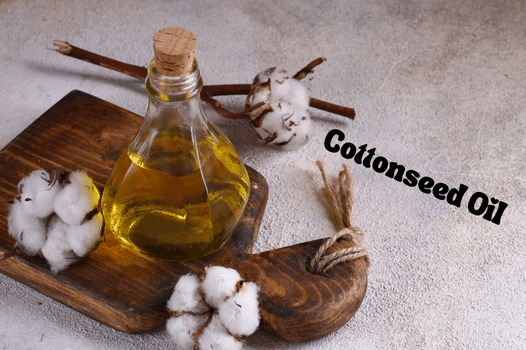Cottonseed oil is an essential oil extracted from the cotton plant’s seeds. It is a clear, pale yellow oil with a mild, neutral flavor and a high smoke point, making it suitable for cooking and frying.
Cottonseed oil has a high level of monounsaturated fats and a moderate level of saturated fats. It commonly uses in various products, including margarine, salad dressings, baked goods, and snack foods. In addition to its use in food, cottonseed oil produces soaps, detergents, and other personal care products.
History of cottonseed oil
This oil has a long history of use dating back to ancient times. Cotton, the plant from which cottonseed oil derives, has been cultivated for centuries and was used by ancient civilizations for various purposes, including the production of textiles and medical remedies.

The use of cottonseed oil as a cooking oil originated in India, where it was used as a cheaper alternative to ghee, a type of clarified butter. This oil was first introduced to the United States in the early 1800s, initially used for soapmaking and later as a cooking oil.
In the late 1800s and early 1900s, people used cottonseed oil extensively to produce margarine and shortening, which significantly increased its production and use. Today, this oil is still widely used in various products, including cooking oils, margarine, and snack foods. It also operates in the production of non-food products such as lubricants, plastics, and paints.
Uses of cottonseed oil
This oil has several uses in food, personal care products, and industrial applications. Some of the most common uses of cottonseed oil in food include:
- Cooking and frying: This oil has a high smoke point, making it suitable for high-heat cooking methods such as frying. It is also commonly used to produce snack foods, such as fried chips and crackers.
- Salad dressings: This vital oil often uses as a base for salad dressings due to its mild flavor and light color.
- Baked goods: This essential oil commonly uses to produce baked goods such as cakes, cookies, and bread.
- Margarine and shortening: Cottonseed oil uses in the production of margarine and shortening as a replacement for butter.
In addition to its use in food, this oil also uses in the production of personal care products such as soaps, shampoos, and lotions. It also operates in the production of industrial products such as lubricants, plastics, and paints.

Production of cottonseed oil
Cottonseed oil produces by extracting oil from the seeds of the cotton plant. The production process involves several steps, including:
- Harvesting and cleaning: Cotton plants harvest, separating the seeds from the lint (the fiber surrounding the bases). The seeds are then cleaned to remove any remaining lint and debris.
- Crushing: The cleaned seeds crush to extract the oil. This is typically done using a mechanical press or solvent extraction method.
- Refining: The crude oil produced from the crushing step then refines to remove impurities and improve the oil’s color, flavor, and stability. This does through a series of processes, including degumming, neutralizing, bleaching, and deodorizing.
- Packaging: The refined cottonseed oil is bottled or packaged in containers for distribution and sale.
It is important to note that the production of this essential oil can negatively impact the environment, including the use of pesticides and the consumption of water resources. Some methods of this oil production may also generate waste products that must dispose of in an environmentally responsible manner.
Description of the cotton plant and its seeds
The cotton plant is a shrubby annual plant that belongs to the mallow family. It is native to tropical and subtropical regions of the world and widely cultivated for its fibers, which make a variety of textiles, including clothing, bedding, and towels.
Cotton plants typically have white or pink flowers, and their seeds contain a protective capsule called a boll. The sources surround by a white, fluffy substance called lint, which use to make the fibers that use to produce textiles.
Cotton seeds are small and oval, typically brown or black. They are high in oil content, averaging 18-20% oil by weight. Cottonseed oil is extracted from the seeds through crushing and refining, as described in the previous answer.
Process of extracting oil from cotton seeds
Several methods for extracting oil from cotton seeds include mechanical pressing and solvent extraction.
Mechanical pressing involves using an automatic press to squeeze the oil out of the seeds. This method typically uses to extract oil from sources that have a low oil content or that are difficult to process using other methods. It is a relatively simple and inexpensive method, but it can also be less efficient and produce oil with a lower yield.
Solvent extraction involves using a solvent, such as hexane, to extract the oil from the seeds. In this method, the seeds are ground into a fine meal and mixed with the solvent, which dissolves the oil. The solvent then evaporates, leaving behind the oil. This method is more efficient and can produce a higher yield of oil, but it is also more expensive and can produce oil with a lower quality due to solvent residues.
After the oil has been extracted from the seeds, it typically refines to remove impurities and improve its color, flavor, and stability. This does through a series of processes, including degumming, neutralizing, bleaching, and deodorizing.
Techniques for refining and processing cottonseed oil
This essential oil is typically refined and processed to improve its color, flavor, and stability. The refining process involves several steps, including:
- Degumming: This process removes impurities, such as phospholipids, which can cause the oil to become cloudy and rancid. Degumming typically does use an acid or an enzyme to break down the impurities.
- Neutralizing: During the neutralizing process, the oil is treated with an alkali to neutralize any remaining acidity and remove impurities such as free fatty acids and pigments.
- Bleaching: Bleaching improves the oil’s color by removing impurities that can cause the oil to appear yellow or brown. This is typically done using clay or bleaching earth.
- Deodorizing: Deodorizing removes any remaining odors or flavors from the oil.
After the refining process, the oil may also process to improve its stability and extend its shelf life. This may involve adding antioxidants or other stabilizers to the oil or fractionating the oil to separate the different types of fatty acids it contains.
It is important to note that the refining and processing of cottonseed oil may produce waste products that must dispose of in an environmentally responsible manner.
Nutritional value of cottonseed oil
This oil is a source of several fatty acids, including monounsaturated, polyunsaturated, and saturated fats. It also contains small amounts of vitamins and minerals. Here is a breakdown of the nutritional content of cottonseed oil per 100 grams (3.5 ounces):
- Calories: 884
- Total fat: 100 grams
- Saturated fat: 14 grams
- Monounsaturated fat: 23 grams
- Polyunsaturated fat: 63 grams
- Cholesterol: 0 milligrams
- Sodium: 0 milligrams
- Total carbohydrates: 0 grams
- Protein: 0 grams
Compared to other essential oils, cottonseed oil is high in monounsaturated and low in saturated fats. It is also relatively low in cholesterol compared to animal-based fats such as butter and lard.
This oil is also a source of vitamins and minerals, including vitamin E and vitamin K. However, remember that these nutrients are in relatively small quantities. It’s also important to be aware that it may not contribute significantly to a person’s overall nutrient intake.
Comparison to other essential oils
This oil is similar to other essential oils in terms of its fatty acid composition and general nutritional value. Here is a comparison of the fatty acid composition of this oil to a few other common essential oils:
Cottonseed oil:
- Saturated fat: 14%
- Monounsaturated fat: 23%
- Polyunsaturated fat: 63%
Canola oil:
- Saturated fat: 7%
- Monounsaturated fat: 61%
- Polyunsaturated fat: 32%
Soybean oil:
- Saturated fat: 15%
- Monounsaturated fat: 23%
- Polyunsaturated fat: 62%
Olive oil:
- Saturated fat: 14%
- Monounsaturated fat: 73%
- Polyunsaturated fat: 11%
As you can see, cottonseed oil is similar to other essential oils in fat composition. Still, it has a higher or lower level of monounsaturated fats compared to canola oil and soybean oil. It has a similar level of saturated fats as olive oil.
It is important to note that the nutritional value of any oil will depend on its specific fatty acid composition and overall calorie and nutrient content. It recommends choosing a variety of oils and fats to incorporate into a healthy diet rather than relying on any one type of oil exclusively.
Amount of fatty acids in cottonseed oil
This essential oil is a source of several fatty acids, including monounsaturated, polyunsaturated, and saturated fats. The specific amount of each type of fatty acid present in cottonseed oil will depend on the particular oil, but here is a general breakdown of the fatty acid composition of cottonseed oil:
- Saturated fat: 14%
- Monounsaturated fat: 23%
- Polyunsaturated fat: 63%
It is important to note that these percentages may vary slightly depending on the specific oil and production method. This oil is generally high in polyunsaturated fats and low in saturated fats compared to other essential oils. Saturated fats and polyunsaturated fats have different effects on health, and it recommends typically to consume a variety of fats in moderation as part of a healthy diet.
Presence of vitamins and minerals in cottonseed oil
This oil is a source of small amounts of several vitamins and minerals. However, it is essential to note that the specific parts of these nutrients in cottonseed oil will vary depending on the particular oil and the production method. Here is a list of some of the vitamins and minerals that may be present in cottonseed oil:
- Vitamin E: This essential oil is a good source of vitamin E, an antioxidant that helps to protect cells from damage caused by free radicals.
- Vitamin K: This oil is a source of vitamin K, vital for blood clotting and bone health.
- Calcium: This vital oil contains small amounts of calcium, vital for strong bones and teeth.
- Magnesium: This essential oil contains small amounts of magnesium, which is essential for muscle function, nerve function, and bone health.
It is important to note that the amounts of these nutrients present in cottonseed oil are relatively small and may not contribute significantly to a person’s overall nutrient intake. It generally recommends consuming various foods to ensure adequate information on essential nutrients.
This essential oil may have several potential health benefits, although more research is needed to understand its effects fully. Some of the potential health benefits of cottonseed oil include the following:
- Effects on cholesterol levels: Some studies have suggested that this oil may benefit cholesterol levels. In one study, people who consumed a diet high in cottonseed oil had lower levels of LDL (bad) cholesterol and higher levels of HDL (good) cholesterol compared to those who consumed a diet high in corn oil.
- Reduced risk of heart disease: Some research has suggested that this oil may protect against heart disease. In one study, people who consumed a diet high in cottonseed oil had a lower risk of developing heart disease than those who drank a diet high in corn.
- Other potential health benefits: This essential oil may also have other potential health benefits, including improving skin health and aiding in weight management. However, more research is needed to understand these effects fully.
It is important to note that the potential health benefits of cottonseed oil may vary depending on the specific oil and the individual. It generally recommends consuming various oils and fats as part of a healthy diet rather than relying on any one type of oil exclusively.
Benefits of cottonseed oil for skin
There is some evidence to suggest that cottonseed oil may have benefits for skin health. This oil is a rich source of antioxidants, which can help to protect the skin from damage caused by free radicals. It is also a good source of vitamin E, an antioxidant known to have skin-protective properties.
Some research has suggested that this oil may have anti-inflammatory effects, benefiting certain skin conditions such as acne and eczema. However, more research is needed to fully understand these effects and determine the optimal dosage and application of cottonseed oil for skin health.
It is important to note that the potential benefits of cottonseed oil for skin may vary depending on the specific oil and the individual. It recommends speaking with a healthcare provider or dermatologist for guidance on using cottonseed oil for skin health.

Benefits of cottonseed oil for hair
There is some evidence to suggest that cottonseed oil may have benefits for hair health. Cottonseed oil is a rich source of antioxidants, which may help to protect the hair from damage caused by free radicals. It is also a good source of vitamin E, an antioxidant known to have hair-protective properties.
Some research has suggested that this oil may have moisturizing effects, which may be beneficial for dry or damaged hair. Cottonseed oil may also help improve the hair’s overall appearance and shine. However, more research is needed to fully understand these effects and determine the optimal dosage and application of cottonseed oil for hair health.
It is important to note that the potential benefits of this essential oil for hair may vary depending on the specific oil and the individual. It recommends speaking with a healthcare provider or dermatologist for guidance on using cottonseed oil for hair health.

Risks and side effects of cottonseed oil
Like any other oil, cottonseed oil has the potential for certain risks and side effects, although more research is needed to understand these effects fully. Some potential risks and side effects of cottonseed oil include the following:
- Allergic reactions: Some people may be allergic to this oil, which can cause skin rashes, hives, or difficulty breathing.
- High-calorie content: This essential oil is high in calories, around 884 calories per 100 grams (3.5 ounces). This may concern people trying to manage their calorie intake for weight loss or other reasons.
- Potential for contamination: This essential oil is produced from the cotton plant’s seeds, which may treat with pesticides or other chemicals during cultivation. It is crucial to choose cottonseed oil that has properly process and refined to minimize the risk of contamination.
- Environmental impacts: The production of cottonseed oil can have adverse effects on the environment, including using pesticides and consuming water resources. Some methods of cottonseed oil production may also generate waste products that must dispose of in an environmentally responsible manner.
It is important to note that the risks and drawbacks of cottonseed oil may vary depending on the specific oil and the individual. It recommends consuming various oils and fats as part of a healthy diet rather than relying on any one type of oil exclusively.
Conclusion
In conclusion, cottonseed oil is a essential oil produced from the cotton plant’s seeds. It has a number of uses, including in cooking, personal care products, and industrial applications. Cottonseed oil is high in monounsaturated fat and low in saturated fats, and it is also a source of small amounts of vitamins and minerals.
Some evidence suggests that cottonseed oil may have potential health benefits, including effects on cholesterol levels and a reduced risk of heart disease. It may also have benefits for skin and hair health. However, more research is needed to understand these effects fully.
Cottonseed oil also has certain risks and drawbacks, including the potential for allergic reactions, a high-calorie content, and the risk of contamination. The production of cottonseed oil can also have negative impacts on the environment. It is essential to consider these factors when deciding whether to include cottonseed oil in your diet or your care routine.
Summary of the main points covered in the article
Here is a summary of the main points covered in the cottonseed oil:
- This oil is a essential oil produced from the cotton plant’s seeds.
- It has several uses in cooking, personal care products, and industrial applications.
- This oil is high in monounsaturated and polyunsaturated fats and low in saturated fats, and it is also a source of small amounts of vitamins and minerals.
- Some evidence suggests that cottonseed oil may have potential health benefits, including effects on cholesterol levels and a reduced risk of heart disease. It may also have benefits for skin and hair health.
- This oil also has certain risks and drawbacks, including the potential for allergic reactions, a high-calorie content, and the risk of contamination. The production of cottonseed oil can also have negative impacts on the environment.
Recommendation for or against the use of cottonseed oil
It recommends consuming various oils and fats as part of a healthy diet rather than relying on any one type of oil exclusively. This can help to ensure adequate intake of essential nutrients and can also help to reduce the risk of any potential hazards or drawbacks associated with any one type of oil.
Cottonseed oil is a source of monounsaturated and polyunsaturated fats, which have been shown to have potential health benefits. It is also a good source of vitamin E, an antioxidant known to have skin-protective properties. However, cottonseed oil is also high in calories and may have the potential for certain risks and drawbacks, including the potential for allergic reactions and the risk of contamination.
Given these factors, it is crucial to consider cottonseed oil’s potential benefits and risks when deciding whether to include it in your diet or your care routine. It recommends speaking with a healthcare provider or a registered dietitian for guidance on using cottonseed oil and other oils and fats.
Sources:
https://pubmed.ncbi.nlm.nih.gov/34387525/
https://pubmed.ncbi.nlm.nih.gov/31112045/
Is cottonseed oil good for you?

Cottonseed oil is a source of monounsaturated and polyunsaturated fats, which have been shown to have potential health benefits. It is also a good source of vitamin E, an antioxidant known to have skin-protective properties. However, cottonseed oil is also high in calories and may have the potential for certain risks and drawbacks, including the potential for allergic reactions and the risk of contamination.
Given these factors, it is crucial to consider cottonseed oil’s potential benefits and risks when deciding whether to include it in your diet or your care routine. It recommends consuming various oils and fats as part of a healthy diet rather than relying on any one type of oil exclusively. This can help to ensure adequate intake of essential nutrients and can also help to reduce the risk of any potential hazards or drawbacks associated with any one type of oil.
It recommends speaking with a healthcare provider or a registered dietitian for guidance on using cottonseed oil and other oils and fats. They can provide personalized recommendations based on your specific needs and health goals.
What is cottonseed oil used for?
Cottonseed oil uses for a variety of purposes, including:
· Cooking: Cottonseed oil is commonly used as a cooking oil due to its high smoke point, making it suitable for high-temperature cooking methods such as frying. It is also relatively inexpensive compared to some other essential oils.
· Personal care products: Cottonseed oil uses a variety of unique care products, including soaps, shampoos, and lotions. It is a good source of vitamin E and may have moisturizing and skin-protective properties.
· Industrial applications: Cottonseed oil uses in a variety of industrial applications, including the production of plastics, rubber, and textiles. It also operates as a lubricant and a solvent in various products.
· Feedstock: This oil uses as a feedstock for the production of biodiesel, a renewable fuel made from essential oils or animal fats.
It is important to note that the specific uses of cottonseed oil may vary depending on the particular oil and the individual. It recommends speaking with a healthcare provider or a registered dietitian for guidance on using cottonseed oil and other oils and fats.
Which oil is better, cottonseed or sunflower?
Cottonseed and sunflower oil are essential oils with several potential health benefits and uses. However, these oils’ specific benefits and drawbacks may vary depending on the particular oil and the individual. Here is a comparison of some of the critical differences between cottonseed oil and sunflower oil:
· Fatty acid composition: Cottonseed oil is high in monounsaturated and polyunsaturated fats and low in saturated fats. In contrast, sunflower oil is high in monounsaturated and polyunsaturated fats and relatively low in saturated fats.
· Smoke point: The smoke point of an oil refers to the temperature at which it begins to break down and produce smoke. Cottonseed oil has a higher smoke point than sunflower oil, which makes it more suitable for high-temperature cooking methods such as frying.
· Nutritional value: Both cottonseed oil and sunflower oil are sources of several types of fatty acids and small amounts of vitamins and minerals. However, the specific parts of these nutrients present in each oil may vary.
It is important to note that the potential benefits and drawbacks of cottonseed oil and sunflower oil may vary depending on the specific oil and the individual. It generally recommends consuming various oils and fats as part of a healthy diet rather than relying on any one type of oil exclusively. This can help to ensure adequate intake of essential nutrients and can also help to reduce the risk of any potential hazards or drawbacks associated with any one type of oil.
Is cottonseed oil better than olive oil?
· Cottonseed and olive oil are essential oils with several potential health benefits and uses. However, these oils’ specific benefits and drawbacks may vary depending on the particular oil and the individual. Here is a comparison of some of the critical differences between cottonseed oil and olive oil:
· Fatty acid composition: Cottonseed oil is high in monounsaturated and polyunsaturated fats and low in saturated fats. In contrast, olive oil is high in monounsaturated fats and relatively low in saturated and polyunsaturated fats.
· Smoke point: The smoke point of an oil refers to the temperature at which it begins to break down and produce smoke. Cottonseed oil has a higher smoke point than olive oil, which makes it more suitable for high-temperature cooking methods such as frying.
· Nutritional value: Cottonseed and olive oils are sources of several types of fatty acids and small amounts of vitamins and minerals. However, the specific parts of these nutrients present in each oil may vary. Olive oil is also a good source of antioxidants, which may have potential health benefits.
It is important to note that the potential benefits and drawbacks of cottonseed and olive oil may vary depending on the specific oil and the individual. It generally recommends consuming various oils and fats as part of a healthy diet rather than relying on any one type of oil exclusively. This can help to ensure adequate intake of essential nutrients and can also help to reduce the risk of any potential hazards or drawbacks associated with any one type of oil.


